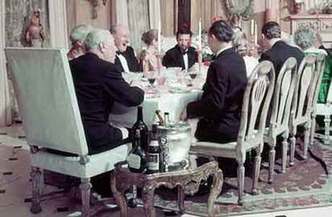Modern manners: paying the bill
你和朋友们一起聚餐的时候,会怎样处理买单的问题呢?你会在用餐快结束时,悄悄地离席,装作去卫生间,然后毫无张扬地把账结了?还是大家AA制?抑或是别人还没来得及提出分摊时,你就先拿出你应付的钱?你是怎么想的呢?聚餐时大家如何付账才合理而且礼貌呢?
Just how do you behave in that awkward moment when the bill arrives at a group meal?
Together we've rifled through the cutlery drawer, extended the hand of respectful friendship to the waiter and decided once and for all that there's no place for flash photography in a temple of gastronomy, but–in typical British fashion–this series has, thus far, skirted awkwardly around the delicate subject of money.
However much we like to pretend otherwise as we relax into a well-cushioned seat and a glass of wine, at some point the fact becomes unavoidable: eating at a restaurant is a business transaction like any other. We've eaten and drunk our way through commodities that don't come for free, enjoyed (or endured) the service of a host of employees, both front of house and behind the scenes–yet for some reason we find the idea of paying for it all excruciating.

Every one of us, at some time or another, have found ourselves embroiled in a heated, yet determinedly "jovial" argument on the arrival of the bill–"No, no, NO – let ME!" we screech through fixed grins, as we claw at the offending scrap of paper. So what's the most gracious way to avoid a Mrs Doyle-style punch-up over a 75p cuppa?
If you're hosting the meal, and intend to pay for it, the situation is relatively simple–as our old friend Emily Post so sagely opined back in 1922, "For a host to count up the items is suggestive of parsimony, while not to look at them is disconcertingly reckless, and to pay before their faces for what his guests have eaten is embarrassing … Therefore, to avoid this whole transaction, people who have not charge accounts, should order the meal ahead, and at the same time pay for in advance, including the waiter's tip."
Although, in these days of allergies and picky eating, I wouldn't advise ordering ahead, a seemly modern solution is to slip off near the end of the meal as if to the loo, and settle up discreetly while you're away from the table, thus forestalling any protest.
But what if you're (oh dreadful phrase!) splitting the bill? In my experience, people who have hitherto appeared perfectly charming can become monsters on the presentation of the damage. "I only had one drink," they announce in an aggressive tone, eyeballing you in a fashion that leaves no doubt that they are well aware that you have not been so abstemious. And when the assorted notes are added up, and fall mysteriously short, it's never them who offer to help make up the extra, even though you suspect them of having been rather mean in their calculation of their share of the tip.
Unless I know that someone around the table is really hard up, and has chosen accordingly, I favour just splitting the bill equally–after all, everyone had the option of choosing whatever they wanted, and to nitpick about your risotto being cheaper than his steak can spoil the atmosphere remarkably swiftly. Non-drinkers, of course, should be automatically excused the cost of the claret.
If you are trying to save money (and let's face it, if you're going out to dinner, it's probably not a question of being on the poverty line, more that you'd prefer to spend your cash elsewhere), you can do it subtly.
Economists suggest that people are more likely to order extravagantly when they think others will be sharing the cost, so it would be sensible to explain early on (without fuss) that you're on a bit of a budget, so you're only going to have a main course, and then put down what you owe, plus a reasonable tip, as soon as the bill arrives, before anyone can mention splitting it. But unless you're in dire straits, don't be mean about it, and ask for the 50p change you're owed–leave it for the waiter.
What do you think – is splitting the bill friendly or ridiculous? Should we forswear this nonsense and simply pay for what we've ordered, or would we be missing out on an important element of sharing a meal? And, most of all, will anyone admit to taking advantage of their fellow diners when they know they'll all be sharing the cost?
相关阅读:
打破常规 开始新生活 Renew your life!Change Up the Routine
(来源:guardian.co.uk,英语点津编辑)